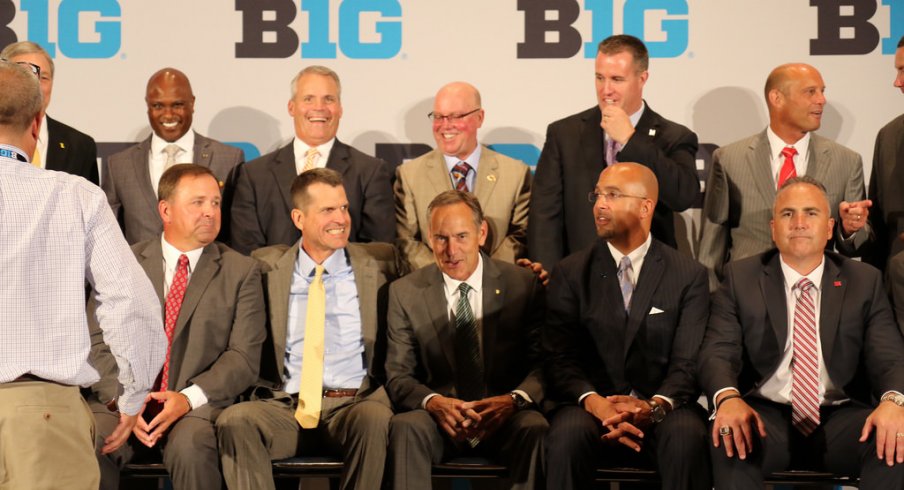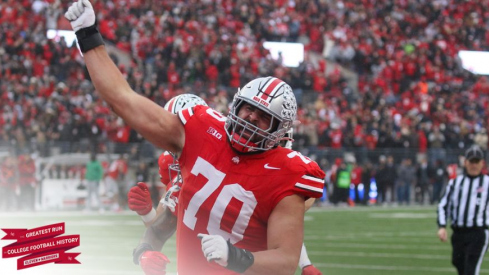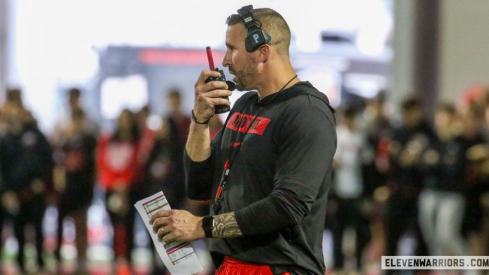Nebraska's head football coach didn't have a winning record on the football field his first year in the Big Ten, but is batting 1.000 when it comes to his take on the now weeklong satellite camp discussion in college football.
"I don't think we're probably done talking about it," Mike Riley said Wednesday as part of a Big Ten teleconference.
The call was meant to put a cap on spring practice across the conference, but instead turned into a medium for coaches in the Power 5 conference to (mainly) voice their displeasure on the NCAA's rule. Big Ten West coaches went Wednesday, while those from the East Division hit the waves Thursday.
"I still frankly don't get it," Riley said. "I just see it more simply as an opportunity for both coaches and players."
Satellite camps served as opportunities for players to potentially earn scholarships and continue not only playing football but further their education. A kid could get an offer from a MAC school after he worked out at Ohio State, because coaches from Bowling Green, Akron, Kent State or Ohio University felt he'd be a good fit for their program.
That's not longer a thing. The NCAA made it so. And Riley is right — the discussion to change the rule back or adjust the old one isn't going away. But let's keep in mind the decision was voted on and decided by the conferences-not the suits sitting in Indianapolis at the NCAA offices.
Big Ten coaches continue talking about the change, however.
"We're all looking at that. I do agree that there are a lot of coaches, most all coaches, there's always an urgency to help the youngsters and their own programs," Michigan coach Jim Harbaugh said Thursday on the teleconference. "And in this case, the spirit of football."
Harbaugh is the main proponent behind the NCAA's interest in the camps. He and his staff made waves with their "Summer Swarm" tour last summer, when they hit schools in seven different states in early June.
Harbaugh stood firm on the idea that having coaches either at his own camps in Ann Arbor, Michigan, or joining them at their place is all about the prospective student-athletes having a better chance to get to the next level.
"I think this affects thousands and thousands and thousands of people," Harbaugh said. "Some people have scoffed at that, but it's at least thousands and thousands. There's a collegial gesture that goes on when you're working a camp. You have coaches from all backgrounds: High school, college, professional. We get together and we talk about the sport of football and trends and best practices.
"(Northwestern coach) Pat Fitzgerald was here last year at our camp, it was a tremendous learning experience for us being around him. (Ex-Ball State coach) Pete Lembo was here, there were many colleges represented. Hundreds of coaches were here."
That's not to say all Big Ten coaches are against the NCAA's decision. Iowa's Kirk Ferentz has been in favor of getting rid of them — even since this time last year.
"Camps, I prefer they were run on campus," he said. "No third parties."
Coaches in the SEC and ACC are the ones upset about the loophole Harbaugh exploited last year that others followed. They want to keep the Big Ten and other conferences away from their fertile recruiting ground in the south, where the best talent roams year in and year out.
The ban affects new Big Ten coaches in a different breath. Rutgers' Chris Ash and Maryland's DJ Durkin have the tall task of competing not only with Harbaugh, but Urban Meyer at Ohio State and Mark Dantonio at Michigan State in the arduous Big Ten East.
The first step in doing that? Recruit better. Without camps, Ash, Durkin and new Illinois coach Lovie Smith must adjust as they lay the groundwork at their new jobs.
"Honestly, we were hoping to be able to build that type of camp here at Rutgers for the East Coast and it's unfortunate we can't," Ash, the ex-Ohio State defensive coordinator, said on the call Thursday. "Do I feel like coaches should be able to go out to 30 satellite camps for the month of June? No, I don't, but I am for having the opportunity to take the program on the road and be able to evaluate certain players in certain areas."
Durkin experienced Harbaugh's "Summer Swarm" firsthand last summer — he served as Michigan's defensive coordinator in 2015. Now as the leader of his own program, he joked when the satellite topic came up on the conference call.
"I was wondering how long it'd take to get a question about that," Durkin said.
That's because it's not going away. Not until the NCAA does something.
"I don't see where it's a bad thing or where it's wrong," Durkin said of hosting a camp. He even called his old boss Harbaugh "as innovative as they come" when it comes to ideas to get better and serve student-athletes.
Harbaugh is everywhere, never shy to do put on his Michigan cap and make a scene whether it is backstage at a Migos concert or on a conference call. In his mind, not having the camps is bad for the "youngsters" trying to get to the next level.
“I wish they would have looked at possibly limiting the number of satellite camps that coaches could be a part of rather than completely banning them. If they were going to ban them, I wish it would be more Power 5 schools. There are a lot of schools out there that really rely on satellite camps and going to bigger universities to get a chance to evaluate prospect.”– Rutgers Coach Chris Ash
The man who coaches his most hated rival agrees, too.
"I just went to a high school coaches association meeting and they're very upset about it," Meyer said Thursday. "They're not upset about the Power 5 conferences moving all over the place and going and visiting places. They're upset that Bowling Green State University, Ohio University, Kent State, all these schools in our state can't come to our camp."
Preventing coaches from smaller school from seeing players that otherwise might not be able to afford to come to another camp farther away puts a tougher strain on everybody.
"A guy was telling me a story about a player on his team that had zero offers. Came to our camp, had seven from MAC schools and other schools in the state of Ohio around this area, because of our camp," Meyer said. "I did not realize that was on the table because I would have been very outspoken about do not take that away. Because that's too, once again that's for the best interest of the young player."
Coaches will bounce back and figure out a new cutting edge way to find players, and as Meyer said Monday, the elite talent will find its way to places like Ohio State, Michigan State, Michigan or even Maryland and Rutgers.
"I'm talking about there's a big chunk of players out there that deserve to play major college football," Meyer said. "I think they'll, I hope they'll revisit it. I'm not saying it's right or wrong, because I don't really know about it. But you always think first about players."
Technology allows for coaches to view a player on film via the Internet, but as always, they want more. Plus, there is something different about seeing a kid in person and talking with him one-on-one.
"I wish they would have looked at possibly limiting the number of satellite camps that coaches could be a part of rather than completely banning them," Ash said. "If they were going to ban them, I wish it would be more Power 5 schools. There are a lot of schools out there that really rely on satellite camps and going to bigger universities to get a chance to evaluate prospect."
Ash isn't wrong, so maybe that is the next step. Changing the rule back to allow the camps, but cut down on the number each coach can attend so as to allow for a centralization of his resources on the recruiting trail.
Either way, the clock continues to tick. And the topic isn't going to die until it is remedied in the eyes of coaches.
"We're going to continue to put more thought into it and have a course of action," Harbaugh said. "We believe here it's beneficial. ... There's always an urgency, in my mind, to help kids and our program and in this case the sport of football."
Added Ash: "I'm all for opportunities given to student-athletes to be exposed to college football coaches to be evaluated for recruiting and scholarship opportunities. I've been doing this for 20 years and I've only been a part of satellite camp. It was successful. I don't necessarily agree with the decision the NCAA made in completely banning all satellite camps. It is what it is and we'll accept it and we'll do business the way we do business here at Rutgers."


